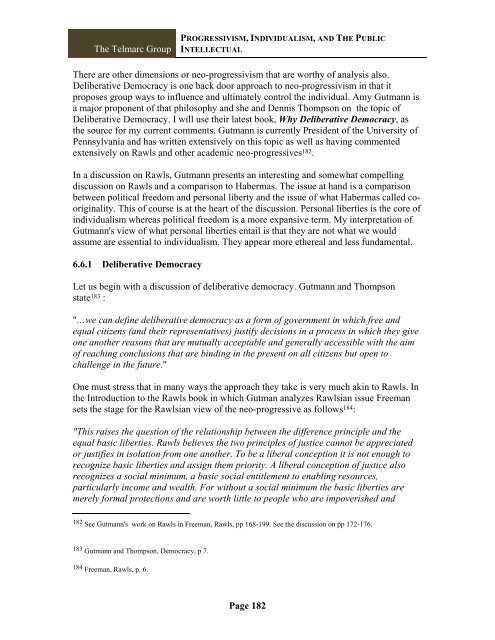progressivism, individualism, and the public ... - Telmarc Group
progressivism, individualism, and the public ... - Telmarc Group
progressivism, individualism, and the public ... - Telmarc Group
Create successful ePaper yourself
Turn your PDF publications into a flip-book with our unique Google optimized e-Paper software.
The <strong>Telmarc</strong> <strong>Group</strong><br />
PROGRESSIVISM, INDIVIDUALISM, AND THE PUBLIC<br />
INTELLECTUAL<br />
There are o<strong>the</strong>r dimensions or neo-<strong>progressivism</strong> that are worthy of analysis also.<br />
Deliberative Democracy is one back door approach to neo-<strong>progressivism</strong> in that it<br />
proposes group ways to influence <strong>and</strong> ultimately control <strong>the</strong> individual. Amy Gutmann is<br />
a major proponent of that philosophy <strong>and</strong> she <strong>and</strong> Dennis Thompson on <strong>the</strong> topic of<br />
Deliberative Democracy. I will use <strong>the</strong>ir latest book, Why Deliberative Democracy, as<br />
<strong>the</strong> source for my current comments. Gutmann is currently President of <strong>the</strong> University of<br />
Pennsylvania <strong>and</strong> has written extensively on this topic as well as having commented<br />
extensively on Rawls <strong>and</strong> o<strong>the</strong>r academic neo-progressives 182 .<br />
In a discussion on Rawls, Gutmann presents an interesting <strong>and</strong> somewhat compelling<br />
discussion on Rawls <strong>and</strong> a comparison to Habermas. The issue at h<strong>and</strong> is a comparison<br />
between political freedom <strong>and</strong> personal liberty <strong>and</strong> <strong>the</strong> issue of what Habermas called cooriginality.<br />
This of course is at <strong>the</strong> heart of <strong>the</strong> discussion. Personal liberties is <strong>the</strong> core of<br />
<strong>individualism</strong> whereas political freedom is a more expansive term. My interpretation of<br />
Gutmann's view of what personal liberties entail is that <strong>the</strong>y are not what we would<br />
assume are essential to <strong>individualism</strong>. They appear more e<strong>the</strong>real <strong>and</strong> less fundamental.<br />
6.6.1 Deliberative Democracy<br />
Let us begin with a discussion of deliberative democracy. Gutmann <strong>and</strong> Thompson<br />
state 183 :<br />
"…we can define deliberative democracy as a form of government in which free <strong>and</strong><br />
equal citizens (<strong>and</strong> <strong>the</strong>ir representatives) justify decisions in a process in which <strong>the</strong>y give<br />
one ano<strong>the</strong>r reasons that are mutually acceptable <strong>and</strong> generally accessible with <strong>the</strong> aim<br />
of reaching conclusions that are binding in <strong>the</strong> present on all citizens but open to<br />
challenge in <strong>the</strong> future."<br />
One must stress that in many ways <strong>the</strong> approach <strong>the</strong>y take is very much akin to Rawls. In<br />
<strong>the</strong> Introduction to <strong>the</strong> Rawls book in which Gutman analyzes Rawlsian issue Freeman<br />
sets <strong>the</strong> stage for <strong>the</strong> Rawlsian view of <strong>the</strong> neo-progressive as follows 184 :<br />
"This raises <strong>the</strong> question of <strong>the</strong> relationship between <strong>the</strong> difference principle <strong>and</strong> <strong>the</strong><br />
equal basic liberties. Rawls believes <strong>the</strong> two principles of justice cannot be appreciated<br />
or justifies in isolation from one ano<strong>the</strong>r. To be a liberal conception it is not enough to<br />
recognize basic liberties <strong>and</strong> assign <strong>the</strong>m priority. A liberal conception of justice also<br />
recognizes a social minimum, a basic social entitlement to enabling resources,<br />
particularly income <strong>and</strong> wealth. For without a social minimum <strong>the</strong> basic liberties are<br />
merely formal protections <strong>and</strong> are worth little to people who are impoverished <strong>and</strong><br />
182 See Gutmann's work on Rawls in Freeman, Rawls, pp 168-199. See <strong>the</strong> discussion on pp 172-176.<br />
183 Gutmann <strong>and</strong> Thompson, Democracy, p 7.<br />
184 Freeman, Rawls, p. 6.<br />
Page 182












